牛津英语6a知识点梳理
牛津6A基础知识汇总

牛津6A基础知识汇总Unit 1单词1:always总是 2:question问题 3:ask问请求要求 4:mean意思是意指 5:must必须应当 6:should应当应该7:shouldn’t=should not不应该 8:pick拾采9:public公共的公众 10:sign标志告示牌子 11:cousin堂(表)兄弟姐妹 12:danger 危险 13:away(离)开 14:grass草地草 15:bird鸟 16:cage笼子 17:quiet安静的 18:noise噪声喧闹声 19:smoke吸烟20:litter乱丢杂物 21:park停放(汽车)22:touch触摸 23:suddenly突然(地) 24:something某事某物 25:note钞票纸币26:around周围在附近 27:nearby附近的 28:quickly快地29:keeper看守人 30:point 指 31:fine罚款短语1. four years old 四岁2. ask Ben some questions 问Ben 一些问题3. go in 进去4. stay away 远离5. keep off 远离6. make noise 发出(喧闹)的声音7. talk about 讨论 8. public signs 公共标志9. No smoking 禁止吸烟 10. No littering 禁止乱扔杂物11. No parking 禁止停车 12. Do not touch 禁止触摸13. Danger! 危险 14. No eating or drinking 禁止吃喝东西15. Keep off the grass 远离草地 16. take a walk 散步17. Be quiet 保持安静 18. be back home from the zoo 从动物园回家19. a ten-yuan note 一张十元纸币 20. say to 对……说21. pick up 拾起 22. come up 上来23. point to 指向 24.look around环顾四周25. fine ¥10 罚款10元 26. birds’cage鸟笼27.walk on the grass 在草地上行走 28.ask sb about sth 问某人关于某事29.no one nearby 附近没有人 30.give me ten yuan=give ten yuan to me 给我十元 31.shake one’s head 摇头句型1:He is asking Ben some questions. 他正在问本一些问题。
沪教版6A牛津英语期末知识点整理
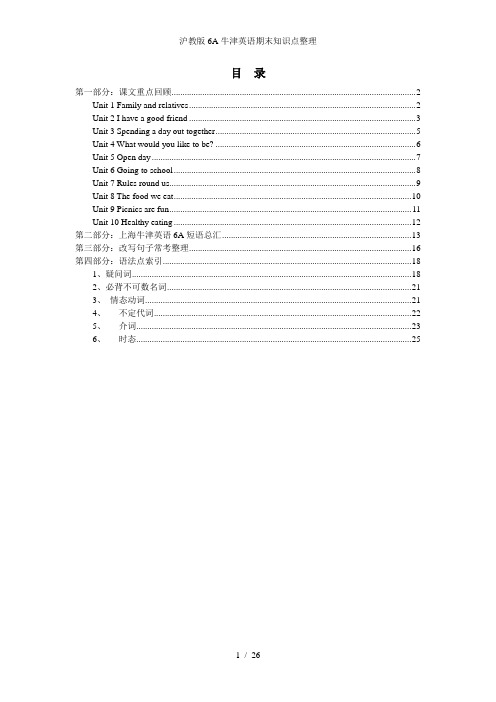
目录第一部分:课文重点回顾 (2)Unit 1 Family and relatives (2)Unit 2 I have a good friend (3)Unit 3 Spending a day out together (5)Unit 4 What would you like to be? (6)Unit 5 Open day (7)Unit 6 Going to school (8)Unit 7 Rules round us (9)Unit 8 The food we eat (10)Unit 9 Picnics are fun (11)Unit 10 Healthy eating (12)第二部分:上海牛津英语6A短语总汇 (13)第三部分:改写句子常考整理 (16)第四部分:语法点索引 (18)1、疑问词 (18)2、必背不可数名词 (21)3、情态动词 (21)4、不定代词 (22)5、介词 (23)6、时态 (25)第一部分:课文重点回顾Unit 1 Family and relatives1. This is my grandfather.这是我的(外)祖父。
These are my family and relatives.这些是我的家人和亲戚。
注意句中各成分保持单复数同形。
2. I‟m their son.. 我是他们的儿子。
We’re their sons.我们是他们的儿子。
3. sth. from sb.某物来自某人。
This is a birthday card from my friend.这是一张来自我朋友的生日卡片。
4. Happy birthday to sb.祝某人生日快乐。
5. one of your family members你的家庭成员之一。
one of后面应接可数名词的复数形式。
6. How many uncles do you have?你有多少个叔叔? How many后面接可数名词的复数形式。
小学牛津英语6A各个单元知识要点
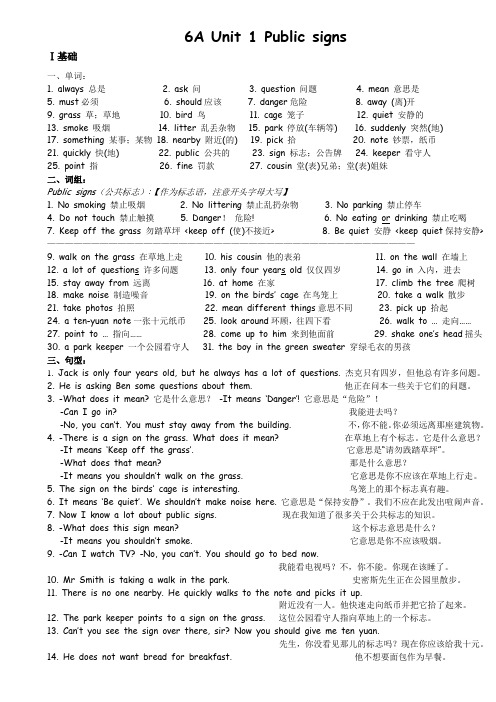
6A Unit 1 Public signsⅠ基础一、单词:1. always 总是2. ask 问3. question 问题4. mean 意思是5. must必须6. should应该7. danger危险8. away (离)开9. grass 草;草地10. bird 鸟11. cage 笼子12. quiet 安静的13. smoke 吸烟14. litter 乱丢杂物15. park 停放(车辆等) 16. suddenly 突然(地)17. something 某事;某物18. nearby 附近(的) 19. pick 拾20. note 钞票,纸币21. quickly 快(地) 22. public 公共的23. sign 标志;公告牌24. keeper 看守人25. point 指26. fine 罚款27. cousin 堂(表)兄弟;堂(表)姐妹二、词组:Public signs(公共标志):【作为标志语,注意开头字母大写】1. No smoking 禁止吸烟2. No littering 禁止乱扔杂物3. No parking 禁止停车4. Do not touch 禁止触摸5. Danger!危险!6. No eating or drinking 禁止吃喝7. Keep off the grass 勿踏草坪<keep off (使)不接近> 8. Be quiet 安静<keep quiet保持安静> ——————————————————————————————————————————9. walk on the grass 在草地上走10. his cousin 他的表弟11. on the wall 在墙上12. a lot of questions 许多问题13. only four years old 仅仅四岁14. go in 入内,进去15. stay away from 远离16. at home 在家17. climb the tree 爬树18. make noise 制造噪音19. on the bird s‘ cage 在鸟笼上20. take a walk 散步21. take photos 拍照22. mean different things意思不同23. pick up 拾起24. a ten-yuan note一张十元纸币25. look around环顾,往四下看26. walk to …走向……27. point to … 指向……28. come up to him 来到他面前29. shake one‘s head摇头30. a park keeper 一个公园看守人31. the boy in the green sweater 穿绿毛衣的男孩三、句型:1.Jack is only four years old, but he always has a lot of questions. 杰克只有四岁,但他总有许多问题。
牛津小学英语6A知识点整理

Unit 1 一词组和日常用语No smoking 禁止吸烟No littering 禁止乱扔杂物No parking 禁止停车Do not touch 禁止触摸Danger!危险No eating or drinking 禁止吃喝keep off the grass 禁止践踏草坪Be quiet 保持安静keep quiet保持安静his cousin 他的表弟on the wall在墙上go in入内a lot of questions许多问题ask sb. some questions about sth.问某人一些有关某事的问题only four years old仅仅四岁a lot of public signs许多公共标志mean different things意味着不同的意思walk on the grass在草地上走make noise发出喧闹的声音know a lot about public signs知道许多有关公共标志的知识the sign on the birds’ cage在鸟笼上的标志climb the tree爬树stay away from the building远离那座建筑物at home在家give me ten yuan给我十元take a walk 散步take photos拍照see something on the grass看见草地上有些东西a ten yuan note一张十元纸币look around看看四周walk to the note走向纸币pick it up 拣起它pick up your pencil拣起你的铅笔come up to him来到他面前a park keeper一个公园管理员point to a sign on the grass指着草地上的一个标志the boy in the green sweater穿着绿色毛衣的男孩shake one’s head摇头on the Internet在网上二.句子1. What does this sign mean? It means ‘No smoking’.It means you shouldn’t smoke.这个标志什么意思?它意味着“禁止吸烟”。
牛津英语6A模块单元知识点总结
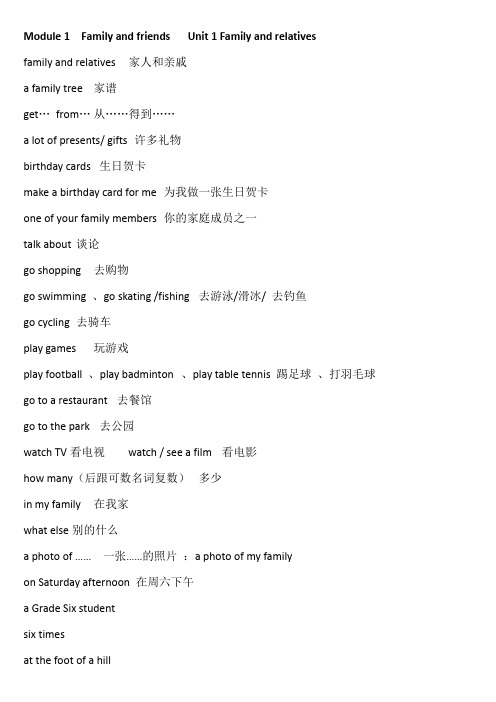
Module 1 Family and friends Unit 1 Family and relativesfamily and relatives 家人和亲戚a family tree 家谱get…from…从……得到……a lot of presents/ gifts 许多礼物birthday cards 生日贺卡make a birthday card for me 为我做一张生日贺卡one of your family members 你的家庭成员之一talk about 谈论go shopping 去购物go swimming 、go skating /fishing 去游泳/滑冰/ 去钓鱼go cycling 去骑车play games 玩游戏play football 、play badminton 、play table tennis 踢足球、打羽毛球go to a restaurant 去餐馆go to the park 去公园watch TV看电视watch / see a film 看电影how many(后跟可数名词复数)多少in my family 在我家what else别的什么a photo of ……一张……的照片:a photo of my familyon Saturday afternoon 在周六下午a Grade Six studentsix timesat the foot of a hillthis --- these ; that --- those;parents , daughter, son, uncle, aunt频率副词:always 、usually、often、sometimes、never 在be动词后,助动词后,情态动词后,实义动词Also “也”,用于句中;too“也”,用于句末;A lot of = lots of “许多,大量”,修饰可数名词复数、不可数名词Eg. a lot of / lots of water ; a lot of / lots of apples;。
牛津6A学习知识点情况总结

牛津英语6A 知识点总结一.名词☆可数名词:可数名词变复数的规则变化不规则变化☆不可数名词:a.b.c.d.e.g.注意:fish 鱼肉(不可数)fish 鱼(可数,单复同形)crab 蟹肉(不可数)crab 螃蟹(可数)☆量词:☆只能接_____________________:a few 几个few 几乎没有many 许多too many 太多☆只能接______________________:a little 一点little 几乎没有much 许多too much 太多too little 太少☆既可以____________________________________:some 许多any 许多plenty of = a lot of=lots of 大量的enough 足够的☆分类:1.___________________________: chicken steak sauages meat2.___________________________: fish crab prawns squid3.___________________________: ice-cream fish balls4.___________________________: milk eggs5.___________________________: chocolate crisps sweets6.___________________________: cakes biscuits bread small cakes7.___________________________: 7-up fruit juice coffee lemonade Coke8.___________________________: carrots onions tomotoes cabbages lettucespotatoes9.___________________________: peaches pineapples oranges pears bananas apples10.___________________________: rice noodles二.冠词☆不定冠词:带有a/an 的词组:a lot of 许多,大量a few 几个a little 一点have a rest 休息have a break 休息have a good time 过得愉快half an hour 半小时☆定冠词:the +形容词的最高级the tallestthe +序数词the second带有the 的词组:play +the +乐器演奏某种乐器in the morning/afternonn/evening 在早上/下午/晚上the same 相同的at the weekend 在周末all the rest 剩下的全部lay the table 摆好餐具on the left 在左边on the left of 在……右边on the right 在右边on the right of 在……左边go to the cinema 去看电影the USA 美国☆零冠词1.月份,星期,季节前2.三餐前3.play+球类4.by +交通工具5. 零冠词的词组:go to school 去上学at school 在学校at home 在家at noon 在中午at night 在下午on weekends 在周末best of all 所有当中最好的go skating 去溜冰go shopping 去购物三.数词☆基数词:表示数量☆序数词:表示顺序在第十层on the tenth floor☆百,千,百万百:hundreds of 数以百计的one hundred 一百two hundred 二百千:thousands of 数以千计的one thousand 一千two thousand 两千百万:millions of 数以百万的one million 一百万two million 两百万☆单位millimetre/er 毫米缩写:_______centimetre/er 厘米缩写:_______metre/er 米缩写:_______ kilogramme 千克缩写:_______ second 秒minute 分hour 小时四.代词☆人称代词:☆指示代词:五.形容词☆形容词的比较级和最高级变化:a). +er +estb). 以e结尾+r +stc). 重度闭音节结尾的,双写+er +estd). 辅音+y结尾的,y改成i+er i+este). 多音节词:more +多音节词most+多音节词特殊变化: good/well------______________------_________________much/many-----_______________-----________________bad------_____________________-----_________________☆句型结构:A 比B 更……A +be+比较级+than +BA最……A +be+the +最高级☆同义句转换:1.Danny is lighter than Peter.2.I am 150 cm. My brother is 180 cm.☆形容词的排序:限数描大形,新色国材名一张灰色的大圆桌_________________________________________________________六.副词☆频度副词:注意:位置:用于__________________时态☆方式副词:用来修饰动词或者动词词组在形容词后面加ly, 以辅+y 结尾,把y变i,再加ly1.loud---____________________2.quiet----_____________________3.slow---_____________________4.quick---_____________________5.happy---____________________七.介词☆表示时间的介词☆in+年,月,季节在一月份in Januaryon+具体的某一天(包括某一天的早上,下午或晚上)在周日on Sunday morning 在周日的晚上on Sunday evening at+时刻在一点十五at a quarter past five☆表示位置的介词1.live in (大地点) Ben and Kitty live in a housing estate.live on +楼层They live on the ninth floor.live at +具体的地点He lives at Flat 18B.2.arrive at(小地点)I'll arrive at Wanda Cinema at nine o'clock.arrive in(大地点)My father will arrive in Beijing tomorrow.3.on+岛屿on Hongkong Island4.in front of in the front of5.next to beside near6.There is a bird_______ the tree.There is an apple________ the tree.☆常用的介词短语1.what about=how about ……怎么样2.Write about 写关于……3.talk about 谈论4. tell sb. about sth. 告诉某人关于某事B. After系列1.look after 照顾2.After school 放学后3.run after 追赶C. For 系列1.be good for 对……有益2.be bad for 对……有害3.look for 寻找4.wait for 等待……5.cook food for people 给人们做饭6shop for food 去买食物7.get ready for…为…做准备8.It's time for +名词到……时间了D. From 系列come from=be from 来自于……E. Like 系列1look like 看起来像……2just like 就像……3.What's the weather like today? 今天天气怎么样?1play with sb. 和某人一起玩play with sth. 玩某物2.share sth with sb. 和某人分享某物3.be crowded with 挤满了…4make…with 用…来做G. Up 系列1.make up 化妆2.dress up 打扮3.grow up 生长H. To 系列1.sell things to people 卖东西给人们2. bring food to people 把东西带给人们3.bring sth to sb.4give sth to sb.5.show sth to sb6.want to do sth.7.need to do sth.8.one’s jurney to 某人去…的旅行9.a visit to…一次去、、、的旅行10fly to…= go to…by aeroplane 乘坐飞机去….I. of 系列1start of visit 参观开始2 end of visit 参观结束3.different kinds of food 不同种类的食物4.a list of foof 食品消费清单5. east of ……的东部6.the first day of Chinese New YearJ. On 系列1.go on a river trip 水上之旅2.go on a picnic 去野餐3.put on 穿上4.get on 上车5.stick…on…把、、、粘到、、、上6.on the pavement 在人行横道上7.on the zebra crossing 在斑马线上8on weekends 在周末9on one's way to 在某人去……的路上10on foot 步行11on the right 在右边☆介词短语后置介词短语后置,起到形容词的作用,来修饰前面的名词The children on page3 of this book are healthy.在书上第三页的孩子们很健康。
牛津英语6a知识点梳理
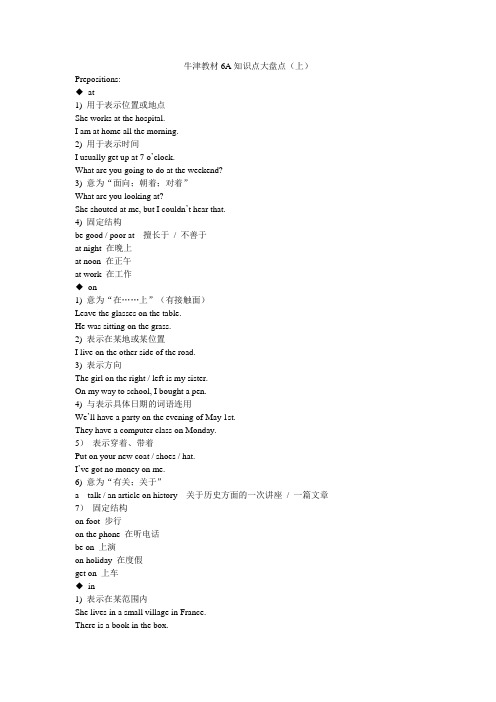
牛津教材6A知识点大盘点(上)Prepositions:◆at1) 用于表示位置或地点She works at the hospital.I am at home all the morning.2) 用于表示时间I usually get up at 7 o’clock.What are you going to do at the weekend?3) 意为“面向;朝着;对着”What are you looking at?She shouted at me, but I couldn’t hear that.4) 固定结构be good / poor at 擅长于/ 不善于at night 在晚上at noon 在正午at work 在工作◆on1) 意为“在……上”(有接触面)Leave the glasses on the table.He was sitting on the grass.2) 表示在某地或某位置I live on the other side of the road.3) 表示方向The girl on the right / left is my sister.On my way to school, I bought a pen.4) 与表示具体日期的词语连用We’ll have a party on the evening of May 1st.They have a computer class on Monday.5)表示穿着、带着Put on your new coat / shoes / hat.I’ve got no money on me.6) 意为“有关;关于”a talk / an article on history 关于历史方面的一次讲座/ 一篇文章7)固定结构on foot 步行on the phone 在听电话be on 上演on holiday 在度假get on 上车◆in1) 表示在某范围内She lives in a small village in France.There is a book in the box.2) 表示在某段时间内It happened in the past.My birthday is in August.3) 表示在某段时间后She will visit there in three weeks.I’ll come back in ten minutes.4) 固定结构be in = be at home 在家in spring / summer / autumn / winter 在春天/ 夏天/ 秋天/ 冬天in time 及时in hospital (生病)住院◆above 在……上方(没有接触面)The people in the flat above mine made a lot of noise.◆below 在……下方(没有接触面)Please do not write below this line.The temperature fell below freezing during the night.Adverbs:◆副词的分类1) 频度副词: always, often, usually, sometimes, seldom, hardly, never2) 地点副词: here, there, everywhere, anywhere, inside, outside3) 程度副词: much, little, very, rather, so, too, still, quite, enough, almost, slightly4) 疑问副词: how, when, where, why5) 表示先后顺序的副词:first / next / then / after that / finally; firstly / secondly / next / then / after that / finally◆副词的位置1) 多数副词都可以放在动词的后面;但如果动词带有宾语,副词就需放在宾语后面。
牛津英语6A期末复习知识点
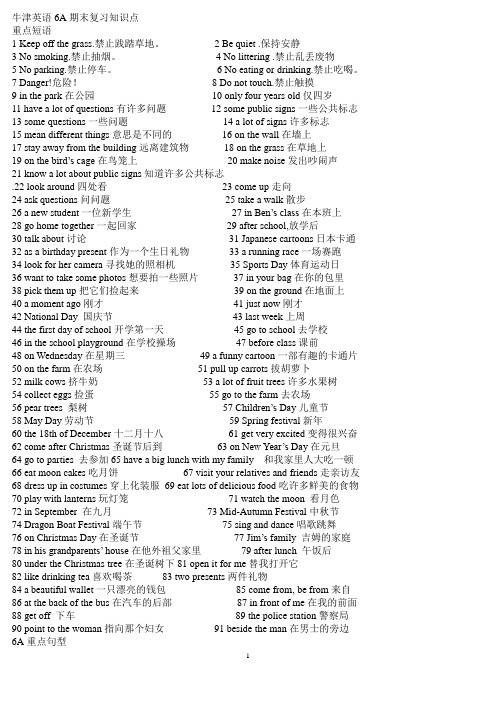
牛津英语6A期末复习知识点重点短语1 Keep off the grass.禁止践踏草地。
2 Be quiet .保持安静3 No smoking.禁止抽烟。
4 No littering .禁止乱丢废物5 No parking.禁止停车。
6 No eating or drinking.禁止吃喝。
7 Danger!危险!8 Do not touch.禁止触摸9 in the park在公园10 only four years old仅四岁11 have a lot of questions有许多问题12 some public signs一些公共标志13 some questions一些问题14 a lot of signs许多标志15 mean different things意思是不同的16 on the wall在墙上17 stay away from the building远离建筑物18 on the grass在草地上19 on the bird’s cage在鸟笼上20 make noise发出吵闹声21 know a lot about public signs知道许多公共标志.22 look around四处看23 come up走向24 ask questions问问题25 take a walk散步26 a new student一位新学生27 in Ben’s class在本班上28 go home together一起回家29 after school,放学后30 talk about讨论31 Japanese cartoons日本卡通32 as a birthday present作为一个生日礼物33 a running race一场赛跑34 look for her camera寻找她的照相机35 Sports Day体育运动日36 want to take some photos想要拍一些照片37 in your bag在你的包里38 pick them up把它们捡起来39 on the ground在地面上40 a moment ago刚才41 just now刚才42 National Day 国庆节43 last week上周44 the first day of school开学第一天45 go to school去学校46 in the school playground在学校操场47 before class课前48 on Wednesday在星期三49 a funny cartoon一部有趣的卡通片50 on the farm在农场51 pull up carrots拔胡萝卜52 milk cows挤牛奶53 a lot of fruit trees许多水果树54 collect eggs捡蛋55 go to the farm去农场56 pear trees 梨树57 Children’s Day儿童节58 May Day劳动节59 Spring festival新年60 the 18th of December十二月十八61 get very excited变得很兴奋62 come after Christmas圣诞节后到63 on New Year’s Day在元旦64 go to parties 去参加65 have a big lunch with my family 和我家里人大吃一顿66 eat moon cakes吃月饼67 visit your relatives and friends走亲访友68 dress up in costumes穿上化装服69 eat lots of delicious food吃许多鲜美的食物70 play with lanterns玩灯笼71 watch the moon 看月色72 in September 在九月73 Mid-Autumn Festival中秋节74 Dragon Boat Festival端午节75 sing and dance唱歌跳舞76 on Christmas Day在圣诞节77 Jim’s family 吉姆的家庭78 in his grandparents’ house在他外祖父家里79 after lunch 午饭后80 under the Christmas tree在圣诞树下81 open it for me替我打开它82 like drinking tea喜欢喝茶83 two presents两件礼物84 a beautiful wallet一只漂亮的钱包85 come from, be from来自86 at the back of the bus在汽车的后部87 in front of me在我的前面88 get off 下车89 the police station警察局90 point to the woman指向那个妇女91 beside the man在男士的旁边6A重点句型1、There are a lot of signs here. 这儿有许多标志。
牛津英语6a语法归纳

6A语法归纳Unit11.概念在过去某个时间里发生的动作或存在的状态:过去习惯性或经常性的动作、行为。
2.时间状语ago,yesterday,the day before yesterday,last week(year,night,month…),in1989,jus t now,long long ago,once upon a time.3.肯定句主语+行为动词(过去式)+其他。
4.例如:I was born in1998.我在1998年出生。
My grandfather died last year.我(外)祖父去年去世了。
5.否定句:主语+didn’t+行为动词(原形)+其他。
例如:He didn’t do his homework yesterday.他昨天没有做他的家庭作业。
I didn’t know you were here.我不知道你在这儿。
6.一般疑问句Did+主语+行为动词(原形)+其他?肯定回答:Yes,主语+did.否定回答:No,主语+didn’t.例如:---Did you go to the zoo last week?你上周去动物园了吗? ---Yes,I did.是的,我去了。
7.动词过去式的规则变化和一些不规则变化构成方法:1) 一般在动词词尾直接加-ed.help-helped,clean-cleaned,visit-visited,show-showed,walk-walked,look-looked,sh out-shouted,point-pointed2)以不发音的字母e结尾的动词,在词尾直接加-d.live-lived,move-moved,like-liked,3)以辅音字母加y结尾的动词,变y为i,再加-ed.study-studied,cry-cried4)以一个元音字母加一个辅音字母结尾的重读闭音节动词,先双写末尾的辅音字母,再加-ed.plan-planned,stop-stopped不规则变化(特殊记忆):am/is-was,are-were,go-went,meet-met,see-saw,do-did,get-got,read-readUnit21.(1)表示天气的形容词warm cool hot coolsunny windy cloudy rainy snowy(2)形容词的用法:(3)形容词可以修饰名词,一般放在名词的前面。
牛津英语6A语法总结
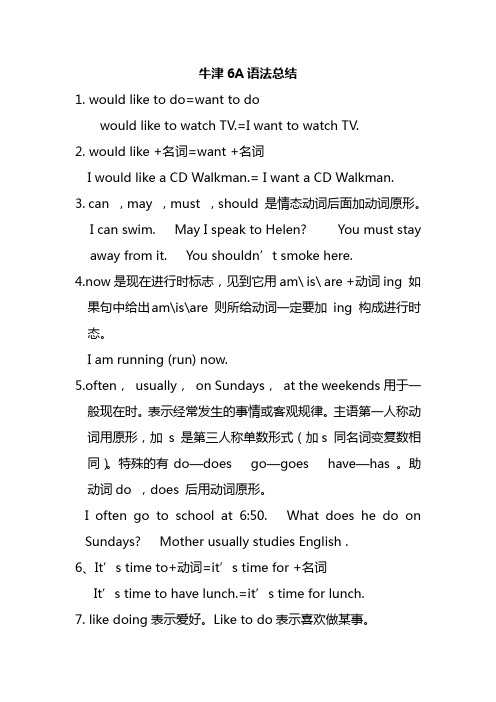
牛津6A语法总结1. would like to do=want to dowould like to watch TV.=I want to watch TV.2. would like +名词=want +名词I would like a CD Walkman.= I want a CD Walkman.3. can ,may ,must ,should 是情态动词后面加动词原形。
I can swim. May I speak to Helen? You must stay awayfrom it. You shouldn’t smoke here.4.now是现在进行时标志,见到它用am\ is\ are +动词ing 如果句中给出am\is\are 则所给动词一定要加 ing 构成进行时态。
I am running (run) now.5.often, usually, on Sundays, at the weekends用于一般现在时。
表示经常发生的事情或客观规律。
主语第一人称动词用原形,加 s 是第三人称单数形式(加s 同名词变复数相同)。
特殊的有do—does go—goes have—has 。
助动词do ,does 后用动词原形。
I often go to school at 6:50.What does he do on Sundays? Mother usually studies English .6、It’s time to+动词=it’s time for +名词It’s time to have lunch.=it’s time for lunch.7. like doing表示爱好。
Like to do表示喜欢做某事。
I like swimming. I like to go with you.8.What date is it today? = what ‘s the date today? 几月几日,回答不能用on. It’s the 24th of January.9. What day is it today?= What’s the day today?问星期几?回答用一周的七天。
牛津英语6A知识点归纳

牛津英语6A知识点归纳Unit11.Nosmoking禁止吸烟2.Nolittering禁止扔杂物3.Noparking禁止停车4.Nocycling禁止骑自行车5.Noeatinganddrinking禁止吃喝6.keepoffthegrass不接近草坪7.Bequiet保持安静8.Donottouch不要摸9.climbtrees爬树10.ridebikes骑自行车11.takephotos拍照片12.gotothepark去公园13.gohome回家14.haveanicecream吃一个冰激凌15.havedinner吃饭16.watchTV看电视17.readone’sbooks读书18.playcomputergames玩电脑游戏19.gotobed睡觉20.alotof\alot大量的;许多21.publicsigns公共标志22.onthewall在墙上23.stayawayfrom…远离……24.walkonthegrass在草地上走25.thebird’scage鸟笼26.makenoise发出噪音27.takeawalk散步28.aten-yuannote一张十元的钞票29.lookaround四周看30.pickup捡起euptosb.走进某人Unit21.anewstudentinBen’sclass本班上的一位新学生2.gohometogether一起回家3.afterschool放学以后4.talkabout谈论有关……esoon快到了6.thethirdofMarch三月三日7.onthetwenty-secondofJuly在七月二十二日8.onthe18thofOctober在十月十八日9.yourbirthday你的生日10.Let’swaitandsee让我们等一下看看11.blowoutthecandles吹灭蜡烛12.asabirthdaypresent作为生日礼物13.birthdaycake生日蛋糕etomybirthdayparty来参加我的生日聚会15.haveabirthdayparty举办生日聚会16.aVCDofJapanesecartoons一张日本卡通光盘17.openthedoor开门18.makeabirthdaycard做一张生日贺卡19.takeoff脱下20.blowout吹灭21.apieceofpaper一张纸22.folditinhalf把它对折Unit31.SportsDay运动日2.allthestudents所有的学生3.beexcited非常激动4.veryexciting非常令人兴奋5.lookfor寻找6.arunningrace一场赛跑7.letmesee让我看看8.amomentago/justnow刚才9.ontheground在地上10.pickthemupforme帮我把它们捡起来11.infrontof在……前面12.nextto紧靠……旁边13.apairofglasses一副眼镜(单数)14.arolloffilm一卷胶卷(单数)15.threediaries三本日记16.apairofearphones一副耳机(单数)17.listentomusic听音乐18.yesterdayevening昨天晚上19.underthetable在桌子下面20.trytoremember试图记住21.intheredbox在红色盒子里22.closeyoureyes闭上你的眼睛23.playagame玩游戏24.withyourclassmates和你的同学们25.overthere在那边26.inmyschoolbag在我的书包里Unit51.NationalDay(国庆日)2.theNationalDayholiday(国庆假期)stweek/lastyear上个星期/去年4.aftertheholiday(假期后)5.gotoschoolearly(很早上学)/early--late6.intheschoolplayground(在学校操场上)7.beforeclass(上课前)/before--after8.watchafilmwithmyparents(和我的父母一起去看电影)/watched9.afunnycartoon(一部有趣的卡通片)/funny(形容词)10.visitafarmwithmyfamily(和我的家人一起参观农场)/visited11.onthefarm(在农场里)12.watertrees(浇树)/watered13.pullupcarrots(拔胡萝卜)/pulledupkcows(挤牛奶)/milked15.Thatwasfun!(那是件有趣的事!)/fun(名词)16.collecteggs(收集鸡蛋)/collected17.fruittrees(果树)18.pickalotoforanges(摘许多橘子)/picked19.tastethem(品尝它们)/tasted20.Wonderful!(太好了!)21.gotothefarm(去农场)/went22.attheweekends(在周末)23.watchcartoons(看动画片)/watched24.visitthezoo(参观动物园)/visited25.listentomusic(听音乐)/listened26.playfootball(踢足球)/played27.playvolleyball(打排球)/played28.cleanthehouse(打扫房子)/cleaned29.visitLiuTao’sgrandparents(拜访刘涛的祖父母)/visited30.campingtrip(野营旅行)31.atacamp(在一个营地上)32.walkinthemountains(登山)/walked33.cookalotoffood(做许多食物)/cooked34.playalotofgames(玩许多游戏)/played35.gocamping(去野营)/went36.plantflowers(种花)/planted37.haveagoodtime(玩得很高兴)/had Unit61.getveryexcited变得非常兴奋eafter在……之后到来3.NewYear'sDay元旦4.onNewYear'sDay在元旦5.atChristmas在圣诞节6.gotoparties去参加聚会7.haveabiglunch吃一顿丰盛的午餐8.atSpringFestival在春节9.WhatdopeopleusuallydoatSpringFestival?人们通常在春节干什么?10.visittheirrelativesandfriends拜访他们的亲戚和朋友11.eatlotsofdeliciousfood吃许多美味的食物stSpringFestival上个春节13.ofcourse当然14.myfavouriteholiday我最喜爱的节日15.inOctober在十月16.dressupincostumes用戏服装扮stHalloween去年万圣节18.Mid-AutumnFestival中秋节19.eatmooncakes吃月饼20.playwithlanterns玩灯笼21.watchthemoo赏月n22.thebeautifulmoon漂亮的月亮23.ondifferentholidays在不同的节日styear去年25.atEaster在复活节26.from…to从……到………27.listentohim听他讲28.inthegrass在草丛中29.apopularholid一个流行的节日ay30.inChina在中国31.inJanuaryorFebruary在一月或二月32.eatricedumplings吃粽子33.liketoplaywithlanterns喜欢玩灯笼34.eatchocolateeggs吃巧克力蛋35.makepumpkinlanterns制作南瓜灯笼36.givepresentstoyourfriends把礼物给你的朋友37.gotoBeijing去北京38.thisafternoon今天下午39.playwithballoons玩气球40.watchcartoons看卡通片41.singanddance唱歌跳舞42.hisconversationwithhisteacher他和他老师的谈话43.meetHelenintheplayground在操场上遇见海伦44.readabookaboutthefarm读关于农场的书45.visitafarmwithmyparents和我的父母亲一起参观农场46.thesameholiday相同的假日47.playwithfriends和朋友玩48.watchthedragonboatraces观看龙舟比赛Unit71.onthe25thofDece在12月25日mbe2.istmasDay圣诞日3.onChristmasDay在圣诞日4.im'sfamily吉姆一家人J5.inhisgrandparent'shouse在他爷爷奶奶的房子里6.Christmastrees圣诞树7.thepresentsundertheChristmastree在圣诞树下的礼物8.somany这么多9.fromgrandmother来自祖母10.openitforme为我打开它11.likedrinkingtea喜欢喝茶12.befrom来自13.Christmaspresents圣诞礼物14.atJim'shouse在吉姆家15.drawandwriteinthediary在日记上画和写16.gotothesupermarket去超市17.sitatthebackofthebus坐在公共汽车的后面18.getoff下车19.theseatinfrontofme在我前面的座位20.thewomanbesidehim在他旁边的妇女21.walktothedriver走向驾驶员22.afterlunch午餐后23.Youarewelcome.不用谢24.nexttotheblackboard紧靠黑板25.getmanypresentsonChristmasDay在圣诞节得到很多礼物26.attheback在……后部27.writehisdiary写他的日记28.undertheseat在座位下面29.openthepresents打开礼物。
牛津6A知识点
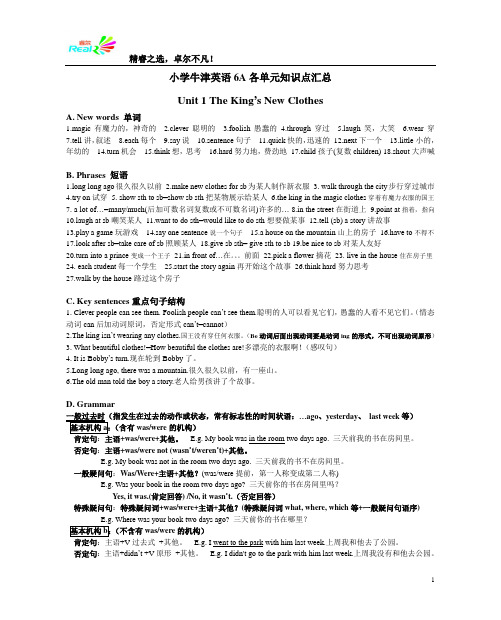
小学牛津英语6A各单元知识点汇总Unit 1 The King’s New ClothesA. New words 单词1.magic有魔力的,神奇的2.clever聪明的3.foolish愚蠢的4.through穿过ugh笑,大笑6.wear穿7.tell讲,叙述8.each每个9.say说10.sentence句子11.quick快的,迅速的12.next下一个13.little小的,年幼的14.turn机会15.think想,思考16.hard努力地,费劲地17.child孩子(复数children) 18.shout大声喊B. Phrases 短语1.long long ago很久很久以前2.make new clothes for sb为某人制作新衣服3. walk through the city步行穿过城市4.try on试穿5. show sth to sb=show sb sth把某物展示给某人6.the king in the magic clothes穿着有魔力衣服的国王7. a lot of…=many/much(后加可数名词复数或不可数名词)许多的…8.in the street在街道上9.point at指着,指向ugh at sb嘲笑某人11.want to do sth=would like to do sth想要做某事12.tell (sb) a story讲故事13.play a game玩游戏14.say one sentence说一个句子15.a house on the mountain山上的房子16.have to不得不17.look after sb=take care of sb照顾某人18.give sb sth= give sth to sb 19.be nice to sb对某人友好20.turn into a prince变成一个王子21.in front of…在。
牛津小学英语6A各单元 知识梳理
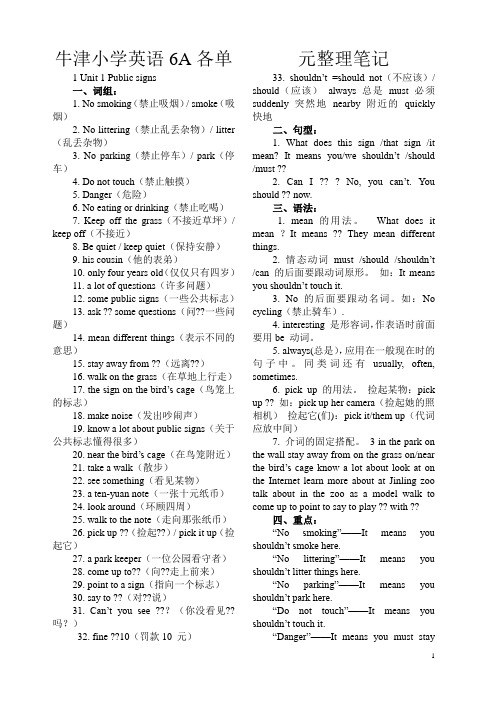
牛津小学英语6A各单元整理笔记1 Unit 1 Public signs一、词组:1. No smoking(禁止吸烟)/ smoke(吸烟)2. No littering(禁止乱丢杂物)/ litter (乱丢杂物)3. No parking(禁止停车)/ park(停车)4. Do not touch(禁止触摸)5. Danger(危险)6. No eating or drinking(禁止吃喝)7. Keep off the grass(不接近草坪)/ keep off(不接近)8. Be quiet / keep quiet(保持安静)9. his cousin(他的表弟)10. only four years old(仅仅只有四岁)11. a lot of questions(许多问题)12. some public signs(一些公共标志)13. ask ?? some questions(问??一些问题)14. mean different things(表示不同的意思)15. stay away from ??(远离??)16. walk on the grass(在草地上行走)17. the sign on the bird’s cage(鸟笼上的标志)18. make noise(发出吵闹声)19. know a lot about public signs(关于公共标志懂得很多)20. near the bird’s cage(在鸟笼附近)21. take a walk(散步)22. see something(看见某物)23. a ten-yuan note(一张十元纸币)24. look around(环顾四周)25. walk to the note(走向那张纸币)26. pick up ??(捡起??)/ pick it up(捡起它)27. a park keeper(一位公园看守者)28. come up to??(向??走上前来)29. point to a sign(指向一个标志)30. say to ??(对??说)31. Can’t you see ???(你没看见??吗?)32. fine ??10(罚款10 元)33. shouldn’t =should not(不应该)/ should(应该)always 总是must 必须suddenly 突然地nearby 附近的quickly 快地二、句型:1. What does this sign /that sign /it mean? It means you/we shouldn’t /should /must ??2. Can I ?? ? No, you can’t. You should ?? now.三、语法:1. mean 的用法。
牛津英语6a知识点梳理

牛津教材6A知识点大盘点(上)Prepositions:◆at1) 用于表示位置或地点She works at the hospital.I am at home all the morning.2) 用于表示时间I usually get up at 7 o’clock.What are you going to do at the weekend?3) 意为“面向;朝着;对着”What are you looking at?She shouted at me, but I couldn’t hear that.4) 固定结构be good / poor at 擅长于/ 不善于at night 在晚上at noon 在正午at work 在工作◆on1) 意为“在……上”(有接触面)Leave the glasses on the table.He was sitting on the grass.2) 表示在某地或某位置I live on the other side of the road.3) 表示方向The girl on the right / left is my sister.On my way to school, I bought a pen.4) 与表示具体日期的词语连用We’ll have a party on the evening of May 1st. They have a computer class on Monday. 5)表示穿着、带着Put on your new coat / shoes / hat.I’ve got no money on me.6) 意为“有关;关于”a talk / an article on history 关于历史方面的一次讲座/ 一篇文章7)固定结构on foot 步行on the phone 在听电话be on 上演on holiday 在度假get on 上车◆in1) 表示在某范围内She lives in a small village in France.There is a book in the box.2) 表示在某段时间内It happened in the past.My birthday is in August.3) 表示在某段时间后She will visit there in three weeks.I’ll come back in ten minutes.4) 固定结构be in = be at home 在家in spring / summer / autumn / winter 在春天/ 夏天/ 秋天/ 冬天in time 及时in hospital (生病)住院◆above 在……上方(没有接触面)The people in the flat above mine made a lot of noise.◆below 在……下方(没有接触面)Please do not write below this line.The temperature fell below freezing during the night.Adverbs:◆副词的分类1) 频度副词: always, often, usually, sometimes, seldom, hardly, never2) 地点副词: here, there, everywhere, anywhere, inside, outside3) 程度副词: much, little, very, rather, so, too, still, quite, enough, almost, slightly4) 疑问副词: how, when, where, why5) 表示先后顺序的副词:first / next / then / after that / finally; firstly / secondly / next / then / after that / finally◆副词的位置1) 多数副词都可以放在动词的后面;但如果动词带有宾语,副词就需放在宾语后面。
牛津小学英语6A主要语法知识及单词词组句式

牛津小学英语6A主要语法知识一般过去时:定义:表示过去某个时间发生的动作或存在的状态,常与表示过去的时间状语连用。
如:yesterday,last night ,three months ago,just now,a moment ago,that night 等。
它的肯定形式:I was born in 1995. I watched cartoons last night.它的否定形式:Were you born in 1995? Yes , I was./No, I wasn’t一般疑问形式及肯(否)定回答:Did you watched cartoons last night? Yes, I did./ No ,I didn’t.特殊疑问形式:When were you born? What did you do last night?动词的过去式形式:a:规则动词的过去式词尾变化:1. 一般情况下加ed,如watered,planted2. 以不发音字母e结尾的加d,如:tasted。
liked,lived3. 以辅音字母+y结尾的变y为i,再加ed,study——studied4. 单音节,以一个元音字母和一个结尾的,双写这个辅音,再加ed,如:stop-stoppedb:规则动词的词尾读音:a) 在浊辅音和元音后读/d/,如:pulled ,wateredb) 在清辅音后读/t/,如cooked , milked ,asked , picked, walkedc) 在/t/和/d/音后读/id/,如:collected , tasted , pointed , studiedc:不规则动词的变化没有什么规律,需要大家背熟记牢:is/am–was are-were do-did have/has-had go-went make-made sit-sat get-got see-saw come-came swim-swam put-put eat-ate drink-drank fly-flew buy-bought run-ran drive-drove know-knew meet-met catch-caught ride-rode sing-sang speak-spoke say-said teach-taught take-took think-thought write-wrote give-gave begin-began tell-told hear-heard keep-kept draw-drew 代词分为两种:人称代词和物主代词。
- 1、下载文档前请自行甄别文档内容的完整性,平台不提供额外的编辑、内容补充、找答案等附加服务。
- 2、"仅部分预览"的文档,不可在线预览部分如存在完整性等问题,可反馈申请退款(可完整预览的文档不适用该条件!)。
- 3、如文档侵犯您的权益,请联系客服反馈,我们会尽快为您处理(人工客服工作时间:9:00-18:30)。
牛津教材6A知识点大盘点(上)Prepositions:◆at1) 用于表示位置或地点She works at the hospital.I am at home all the morning.2) 用于表示时间I usually get up at 7 o’clock.What are you going to do at the weekend?3) 意为“面向;朝着;对着”What are you looking at?She shouted at me, but I couldn’t hear that.4) 固定结构be good / poor at 擅长于/ 不善于at night 在晚上at noon 在正午at work 在工作◆on1) 意为“在……上”(有接触面)Leave the glasses on the table.He was sitting on the grass.2) 表示在某地或某位置I live on the other side of the road.3) 表示方向The girl on the right / left is my sister.On my way to school, I bought a pen.4) 与表示具体日期的词语连用We’ll have a party on the evening of May 1st.They have a computer class on Monday.5)表示穿着、带着Put on your new coat / shoes / hat.I’ve got no money on me.6) 意为“有关;关于”a talk / an article on history 关于历史方面的一次讲座/ 一篇文章7)固定结构on foot 步行on the phone 在听电话be on 上演on holiday 在度假get on 上车◆in1) 表示在某范围内She lives in a small village in France.There is a book in the box.2) 表示在某段时间内It happened in the past.My birthday is in August.3) 表示在某段时间后She will visit there in three weeks.I’ll come back in ten minutes.4) 固定结构be in = be at home 在家in spring / summer / autumn / winter 在春天/ 夏天/ 秋天/ 冬天in time 及时in hospital (生病)住院◆above 在……上方(没有接触面)The people in the flat above mine made a lot of noise.◆below 在……下方(没有接触面)Please do not write below this line.The temperature fell below freezing during the night.Adverbs:◆副词的分类1) 频度副词: always, often, usually, sometimes, seldom, hardly, never2) 地点副词: here, there, everywhere, anywhere, inside, outside3) 程度副词: much, little, very, rather, so, too, still, quite, enough, almost, slightly4) 疑问副词: how, when, where, why5) 表示先后顺序的副词:first / next / then / after that / finally; firstly / secondly / next / then / after that / finally◆副词的位置1) 多数副词都可以放在动词的后面;但如果动词带有宾语,副词就需放在宾语后面。
如:I get up early in the morning every day.He gave me a gift yesterday.The train goes fast.2) 副词修饰形容词、副词时,副词在前面,被修饰的词在后面。
如:It’s rather easy. I can do it.He did it quite well.It’s much better.3) 频度副词可放在实义动词的前面,情态动词和助动词的后面。
如:I often help him these days.You needn’t always help me.We usually go shopping at weekends.The new students don’t always go to dance.4) 疑问副词以及修饰整个句子的副词,通常放在句子或从句的前面。
如:When do you study every day?Can you tell me how you did it?First, let me ask you some questions.5) 时间副词和地点副词在一个句中时,地点副词放在前面,时间副词放在后面。
如:We went shopping in the supermarket at 9 o’clock yesterday.An accident happened in the Eleven Avenue one hour ago.关于数量的修饰词◆仅修饰可数名词的有:few, a few, many。
如:He is new here, so he has few friends.He is kind, so he has quite a few friends.Many people came to Beijing for the Olympic Games.◆仅修饰不可数名词的有:little, a little, much。
如:There is little rain in the desert (沙漠).There is only a little fresh water on the Earth.He got much information just now.◆既可修饰可数名词又可修饰不可数名词的有:some, plenty of, a lot of, enough。
如:I have some paper. (接不可数名词)I have some newspapers. (接可数名词)There is plenty of time left. (接不可数名词)There are plenty of seats in the room. (接可数名词)I usually have a lot of milk. (接不可数名词)I usually have a lot of vegetables. (接可数名词)We have got enough time. (接不可数名词)We have got enough rooms. (接可数名词)TensesImperative Sentences◆Do型肯定句:Look at the blackboard, please.否定句:Don’t open the window.◆Be型肯定句:Be brave.否定句:Don’t be afraid of making mistakes.◆Let型肯定句:Let him have a short break.否定句:Let him not have a short break.Don’t let him have a short break.非谓语结构◆to dotell sb. to do / tell sb. not to do, promise to do / promise not to do, would like to do / wouldn’t like to do, It takes sb. some time to do, need to do◆doinglike doing, go doing, finish doing, enjoy doingExpressions of Comparisons◆原级比较:as ... asMy diet is as healthy as his diet.◆比较级比较:thanMy diet is healthier than his diet.My diet is less healthy than his diet.注:只有形容词和副词才有比较级。
Wh- questions◆What else do you do with him? 别的什么◆Which place shall we visit? 哪个地方◆When are we going there? 什么时候◆What time do you get up? 什么时候(具体时间)◆What would you like to be? 什么(职业)◆What would you like for dinner? 什么(食品)◆What kind of books would you like? 什么种类How questions◆How many brothers do you have? 多少(数量)◆How are we getting there? 怎样(方式)◆How much does it cost? 多少(价钱)◆How about this shirt? 怎样(建议)◆How long does it take you to get there? 多久(时间)◆How often do you visit your grandparents? 多久一次(频率)牛津教材6A重点动词词组归纳(上)1. go shopping (swimming, cycling) 去购物(游泳、骑车)e.g. I always go shopping with my mother.2. play badminton 打羽毛球e.g. Let’s play badminton together.3. talk to sb. / talk with sb. 和某人交谈e.g. I’ll talk to him tomorrow afternoon.4. walk to school = go to school on foot 步行去上学e.g. My brother and I always walk to school.5. be late for 迟到e.g. Bill is always late for school.6. get angry 生气e.g. Jane is a good girl and she never gets angry.7. be kind to ... 对……友好e.g. The teacher is kind to us.8. share ... with ... 和……分享……e.g. I share a room with my brother.9. tell lies 撒谎e.g. You mustn’t tell lies.10. look after = take care of 照顾;关心e.g. Can you look after my baby?11. pick up 捡起e.g. Please pick up the litter on the floor.12. tell sb. (not) to do sth. 要求某人(不要)做某事e.g. My mother told me to buy some sugar for her.13. promise (not) to do sth. 答应(不)做某事e.g. I promise not to be late.14. put out fires 灭火e.g. Firemen can help people put out fires.15. find out 查明e.g. I’ll find out where they live.16. arrive in / at 到达e.g. My father arrived in Beijing yesterday evening.We will arrive at the hotel early.17. take photos 拍照e.g. Kitty took a lot of photos of the birthday party.18. have a good time = enjoy oneself 过得愉快e.g. They had a good time at People’s Park.19. get to (get there) 到达(到那儿)e.g. Excuse me, how can I get to the nearest supermarket? When I got there, they were having a meeting.20. keep quiet 保持安静e.g. We must keep quiet in the library.21. leave rubbish 扔垃圾e.g. We mustn’t leave rubbish everywhere.22. wait for 等候e.g. Hurry up! Your father is waiting for you at the school gate.23. turn left / right 左/ 右转e.g. Turn left and go straight ahead.24. go upstairs / downstairs 上楼/ 下楼e.g. We want to go upstairs.。
